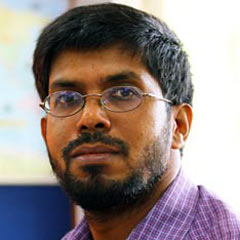"His money is his enemy" was an oft-heard statement on the corridors of power in Karnataka, whenever the focus of political discussions turned on former minister and eight-time member of the Legislative Assembly D.K. Shivakumar.
Thanks to the riches that he has amassed, it was well known much before his sensational arrest earlier this week by the Enforcement Directorate in Delhi that he had too many skeletons in his cupboard.
But no one expected the skeletons to tumble out of the cupboard the way they did.
In fact, many believe that they would not have possibly tumbled out had he not hogged the national limelight in 2017 by harboring 42 Gujarat MLAs in a resort that he owned to protect them from being poached by the BJP, just before a Rajya Sabha election.
By sheltering these MLAs, he helped Congress strongman Ahmed Patel get re-elected to the Rajya Sabha much to the chagrin of BJP President Amit Shah. That Shivakumar's troubles started soon after this, with a series of raids on his house and properties, makes it difficult to guess whether it is the law catching up with him or an attempt to settle political scores.
The merits of the cases against the Congress leader may forever remain shrouded in legal quagmire and the Congress allegations of a BJP conspiracy behind the arrest may similarly persist unsubstantiated for want of concrete evidence.
However, what seems clear is that as Shivakumar stands neck-deep in legal trouble, a possible revival plan of the Congress in Karnataka has received a setback.
With a prominent face of the party who has played multiple crucial roles during its hours of crises as a trouble-shooter, strategist, organizer, and fund-raiser out of the scene at least temporarily, the Congress will find it difficult to put up a formidable front against the BJP, which has launched an all-out strategy to establish itself more firmly in the state.
Karnataka is the only BJP-ruled State where the Congress could have hoped for a quick bounce-back.
It seemed possible with Shivakumar's organizational abilities and indomitable energy on the one hand and former Chief Minister Siddaramaiah's 'mass-leader image' on the other.
The Congress could have risen up to beat the BJP at least in southern Karnataka.
With the Lingayats of northern Karnataka firmly behind the BJP, the Congress revival hinged much on the support it could have regained in the Vokkaliga-dominated Southern districts.
Although, Shivakumar's influence as a vote-catcher has never been proved beyond his own constituency of Kanakapura in Bangalore Rural District, of late he was hoping to emerge as the political face of the Vokkaliga community, to which he belongs.
He had reasons to harbor this hope as the long-time hold of former Prime Minister H.D. Deve Gowda and his JD(S) over the Vokkaliga voters had been on the decline as was evident in the 2019 Lok Sabha election results.
The BJP has also been trying to wean the Vokkaligas away from the JD(S) and it saw Shivakumar as the major hurdle in this.
Now that he might be out of the scene for some time, it could help the BJP to establish its base in the Vokkaliga belt.
At the same time, the arrest may also generate some sympathy for Shivakumar especially among Vokkaliga voters.
The BJP's attempts to stand on a moral high ground by getting the "bad guy" arrested has few takers as the saffron party too has its "money bag" politicians.
Moreover, the BJP's wanton display of money power to get the opposition MLAs resign in its bid to dislodge the JD(S)-Congress coalition government recently is too fresh in public memory. But, to what extent will Shivakumar be able to capitalize on this sympathy is dependent on how soon he will untangle the legal knots.
Interestingly, although the Congress national spokespersons as well as state and local leaders have quickly rallied in support of the leader in trouble, there has been no word from Rahul Gandhi during the entire episode.
While his response was instantaneous when senior leader P. Chidambaram was arrested, the silence in the case of Shivakumar is quite intriguing considering that much of Karnataka leader's trouble today is the result of the 'dirty work' that he did for the party with unflinching loyalty.
At the same time, Chief Minister Yediyurappa's statement that none will be happier than him to see Shivakumar come out unscathed' is seen as sympathy coming from unexpected quarters.
It seems there are many unseen wheels within wheels in the intricate web of political networks.
In any case, Shivakumar's saga sends out a strong message of caution to all those who are ready to play the "money bag" role for political parties and go berserk in amassing personal wealth in the process.
(A Narayana is an associate professor with Azim Premji University in Bengaluru. He is a policy researcher and a political commentator)

















